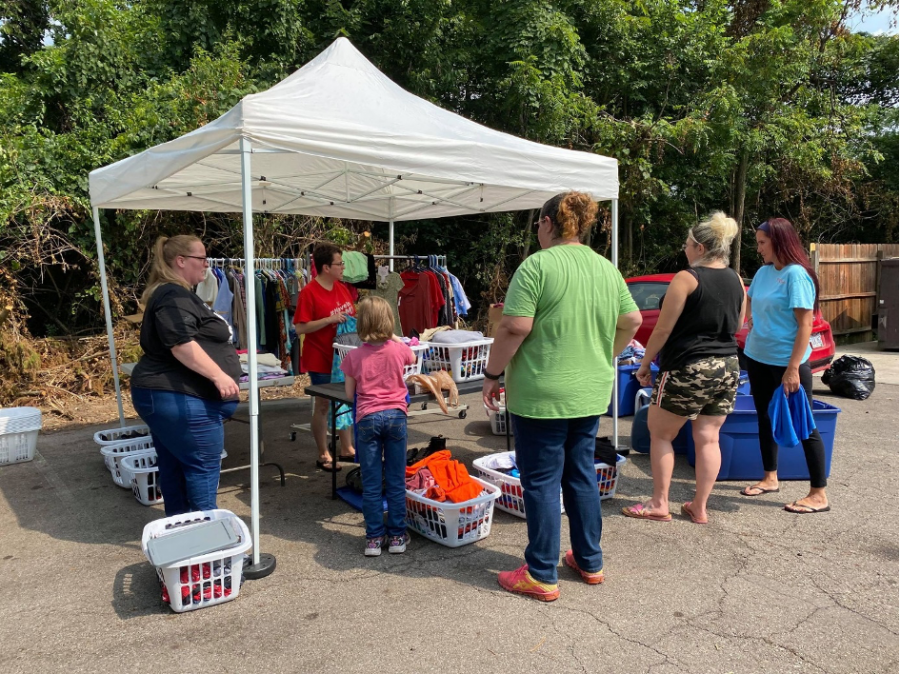Nonprofit uses love of fabric to give back to community
Photo provided by Shana Rosenberg
Thread Up Oxford hosted a free clothing shopping venture with Talawanda Oxford Pantry Social Services (TOPSS) in August.
October 1, 2021
Thread Up Oxford wants the clothes off your back – after you’re done with them.
The nonprofit’s mission is to reduce textile waste while providing residents with a variety of recycled clothing.
Founder Shana Rosenberg said she has had a lifelong love of fabric. She grew up sewing with her mom and viewing elaborate costumes backstage on Broadway and molded her love into an entrepreneurial passion. She said she hopes to create a clothing culture change in the community.
“With the name, I wanted to come up with something that is both green and community focused, so Thread Up Oxford is literally about threading the community together to work on this local change,” she said.
Rosenberg started a Facebook group, “Thread Up Oxford, Ohio,” in March. That’s where the organization does its community outreach, giving people a chance to share what they know about fabric, the textile industry and projects they are working on. Rosenberg said she wants to make sure everyone feels they are part of the solution of textile reduction. The group currently has more than 450 active members.

As a result of these local community connections, Rosenberg has gotten involved with the social impact program within Miami University’s Western program. Students helped Rosenberg with branding and created a GoFundMe campaign. A biology professor also reached out to her regarding a guest lecture for a class at the university.
In April, Thread Up Oxford hosted its debut textile drive in the parking lot of Oxford Lane Library. The drive collected approximately 2,700 pounds of textiles, including sheets, blankets, clothes and even single socks.
Thread Up Oxford targets the ever-growing issue of the fast fashion industry. According to a 2018 piece published in the open access website Environmental Health, “fast fashion” describes readily available and inexpensive clothes designed to move swiftly from the fashion catwalk to stores to customers in a quickly repeating cycle. This creates a constant demand for new clothes and a constant disposal of the old.
According to Environmental Health, the average American throws away approximately 80 pounds of clothing and textiles annually, occupying nearly 5% of landfill space. Fast fashion encourages the idea that clothing can be cheaply made and easily disposable.
”When you look at fast fashion issues, it is very cultural,” Rosenberg said. “We think we need to change our clothes every few months, but we do not need to over-consume clothing. You can give to Goodwill or even give to a church, anything to keep it out of a landfill.”
Some recipients of Thread Up Oxford’s recycled textiles include Care Center veterinarians, in Blue Ash, which received towels to use in its clinic, and the Oxford Cares school backpack program. The program also donated clothing to the Oxford Family Resource Center and Talawanda students.
Oxford resident Andrea Yaeger has had several experiences with the organization. On the receiving end, she posted in the Facebook group about needing a costume for her son, and Rosenberg quickly notified her that she had the perfect set of items to donate. Yaeger’s daughter and her friends also got their homecoming dresses secondhand through Thread Up Oxford.
Rosenberg also convinced Yaeger to donate a T-shirt from a fundraising event back into the initiative, explaining how too many shirts are produced for one-time events.
“Thread Up Oxford’s posts have really made us pay more attention to what we are buying and where it ends up,” said Yaeger.
Another frequent donor in Oxford is Marion Schloemer. A relocation and moving manager, she utilizes the nonprofit to drop off her clients’ old textiles.
“We’re seeing more people of retirement age choosing to stay in Oxford,” Schloemer said. “I think people in transition are finding that they have textiles that they no longer need, but want to keep out of the landfill. I think that Thread Up can impact the Oxford community by providing an avenue for just that.”
Rosenberg said she dreams of having a retail space large enough to open a clothing bank. Such a facility could include a “makers-space” where tools, fabrics, ribbon and cutter boards are available to anyone who wants to experiment with design, she said. Ultimately, the organization would like to partner with a fiber recycling company to collect the community’s textile waste, she said.
In the more immediate future, patrons can look for Thread Up Oxford at the weekly Uptown Farmers Market, near the sprouts booth. Attendees can paint trick or treat bags made of upcycled pillowcases while learning about reusing the textiles that they have. Other projects Thread Up hopes to host are mending clinics and upcycle workshops, as well as continued monthly clothing drives.














